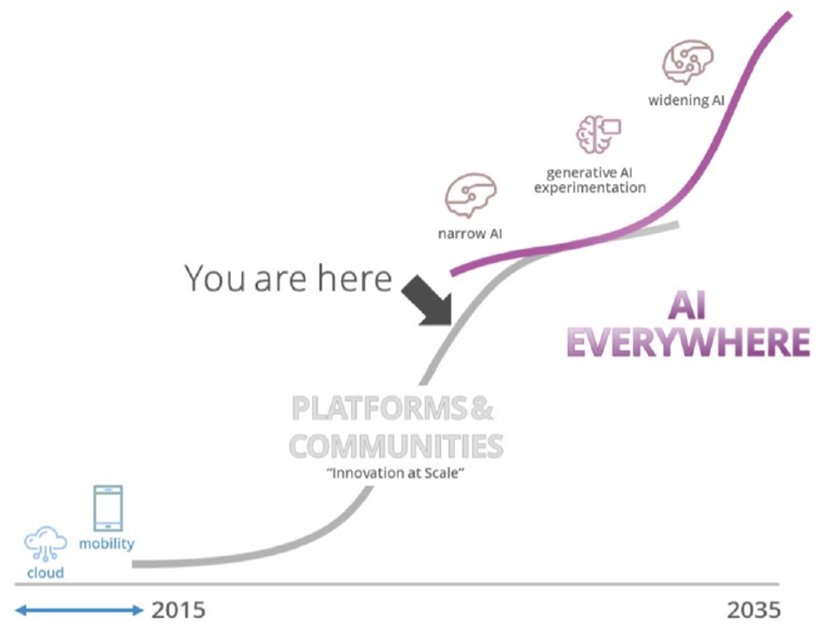the health strategist
institute for
strategic health transformation
& technology
Joaquim Cardoso MSc.
Chief Research & Strategy Officer (CRSO),
Chief Editor and Senior Advisor
August 29, 2023
What is the message?
There are opportunities and challenges presented by generative AI (GenAI) in the realm of enterprise intelligence.
Organizations are grappling with the increasing complexity of data and are seeking to harness the potential of GenAI to drive innovation, improve decision-making, and navigate the ever-changing technological landscape.
1. Importance of Enterprise Intelligence: The text highlights that organizations are investing substantial resources in data analytics and AI technologies to gain insights, enable agility, and foster a culture of innovation. However, many organizations still struggle to synthesize information, collectively learn, deliver insights at scale, and cultivate a data culture.
2. Generative AI’s Potential and Challenges: Generative AI, represented by GenAI, is positioned as a transformative technology with the ability to revolutionize content creation, data analysis, and more. Despite its potential, there are concerns and challenges related to trust, data quality, and ethical considerations.
The text emphasizes that while 89% of respondents understand the potential of GenAI, it is a nascent technology and its applicability will expand over time.
3. Transition and Adoption: The text suggests that a transition in computing is imminent, marked by the adoption of GenAI and its potential to reshape industries. The technology is expected to evolve, and organizations will need to identify strong use cases and proven outcomes as they adapt to and innovate with GenAI.
4. Hurdles and Skill Gap: Despite the excitement around GenAI, the text acknowledges significant challenges that organizations need to overcome. While a substantial percentage of respondents feel prepared to leverage AI technologies, a smaller percentage have fully operationalized previous AI initiatives. There’s also a notable skills gap related to GenAI, and the lack of necessary skills poses a potential obstacle.
5. Trust and Governance: The text underscores the importance of trust and governance in the context of GenAI. While respondents express trust in their organization’s ability to leverage GenAI, there are concerns about data quality, integrity, and ethical implications. The need for caution arises from potential security risks and data governance challenges.
6. Successful Organizations: The text suggests that organizations with high levels of enterprise intelligence, which includes effective information flow, collective learning, insights delivery, and a data culture, tend to achieve better business outcomes. Organizations that align their enterprise intelligence strategy with their business strategy and leverage technologies like GenAI can differentiate themselves and navigate market uncertainties effectively.
In summary, the text discusses the potential of generative AI to transform enterprise intelligence, addresses the challenges and considerations associated with its adoption, and emphasizes the importance of responsible implementation, data governance, and organizational preparedness for success in the evolving technological landscape.
DEEP DIVE

The Possibilities and Realities of Generative AI
IDC
Chandana Gopal, Research Director, Future of Intelligence
Dan Vesset, Group Vice President, Analytics and Information Management
July 2023, Sponsored by: Teradata
A Transition Is Coming
Executives who are investing in enterprise intelligence want to be more agile than their competitors, enable everyone in the organization to ideate and innovate, and allow the organization to learn from the past and accelerate toward the future.
IDC Big Data and Analytics research shows that organizations spent upwards of $250 billion on data analytics and AI software, hardware, and services in 2022, …
… but still continue to struggle to develop the capabilities related to enterprise intelligence such as:
- synthesizing information,
2. collectively learning,
3. delivering insights at scale, and
4. fostering a data culture.
In a recent IDC global survey of 900 respondents sponsored by Teradata, only one-third of organizations cited that they were experts at being able to get full value from their data. Making sense of all data is difficult in a modern data environment, where data is highly distributed, diverse, and dynamic.
· Nearly 70% of respondents mentioned that their data complexity has increased in the past two years and almost 85% expect that it will continue to increase or remain constant in the next two years.
· In fact, around 20% believe that data complexity has significantly increased in complexity in the last two years and will continue to increase at the same pace over the next two years.
How are organizations expecting to cope with this increased complexity, continue to drive value from data, and increase their enterprise intelligence?
Many leaders are turning to AI, and specifically generative AI (GenAI), at this seminal moment in the technology landscape.
GenAI and its potential for driving innovation and disruption has simultaneously captured attention and raised several red flags among business leaders across the world.
No other technology has achieved what GenAI has done in less than a year — sparked the imagination of millions, disrupted the way humans create content, and fundamentally changed the way people think and work. There is clear value in what GenAI brings to the table, whether it is in creating new content, interpreting data analysis, or writing code.
· Eighty-nine percent of respondents said that they understand the merits and potential of GenAI;
· however, the technology is nascent and we are just at the beginning of this journey.
GenAI’s applicability will broaden into new use cases across industries; however, it will not be the panacea for all issues facing enterprises:
· 57% of respondents think that interest in GenAI will fade over time.
When a disruptive technology like GenAI comes into the market, the hype around it tends to blur the challenges that organizations will face in implementing it, but with time, proven use cases with strong business outcomes will emerge and organizations will adapt and innovate using GenAI as it matures.
FIGURE 1 — A Transition Is Coming

Source: IDC, 2023
The Realities of Launching Generative AI Initiatives
As excited as executives are about GenAI right now, there are significant hurdles to cross for most organizations.
· IDC’s survey found that, although 75% of respondents said that they were very well prepared or extremely well prepared to leverage technologies like large language models (LLMs) in their organizations,
· only 27% of the same respondents said that their previous AI initiatives were completely operationalized,
· and only 30% said that they had achieved the maximum level of expertise when it came to using advanced analytics, data science, and machine learning in their organizations.
Organizations recognize the value of AI, and 80% of respondents believed that their organizations’ investments in AI/ML initiatives were very or extremely sufficient, and 67% had definite plans for hiring senior leadership to spearhead these initiatives.
· Almost 30% of respondents cited that they were extremely ready to leverage GenAI in their organizations;
· however, there continues to be a significant skills gap with 58% saying that they anticipate having a shortage of, at least, some GenAI skills.
For example, while IDC research shows that data literacy is paramount to being able to use GenAI effectively,
· only 37% of CFOs and
· 44% of CEOs are believed to have expert levels of data literacy.
These same executives are facing significant pressure from the market and their boards to invest in GenAI,
· with almost 95% stating that they are under at least some pressure to leverage GenAI in the next 6 to 12 months and
· 56% of respondents feel that they are under high or significant levels of pressure to leverage GenAI.
There is no doubt that GenAI will usher in a new era in computing, because the technology drastically reduces the time and costs associated with developing a wide range of use cases associated with automation and enterprise intelligence.
What is supremely important is that organizations understand the guardrails they need to put in place before launching GenAI or any AI initiatives.

Considerations Before Implementing Generative AI
Due to its propensity to generate hallucinations, such as fake citations or content that is so close to mimicking the truth as to be believable, GenAI comes with a host of challenges that organizations must address.
Respondents to our survey were very optimistic about the level of trust that they had in their organization’s ability to leverage GenAI, with
· 79% citing that they had significant or high levels of trust.
· However, 86% of respondents also agreed that they needed more governance to ensure data quality and integrity, and
· 66% had concerns about the consequences of GenAI.
A cautionary approach to GenAI is warranted due to the security risks of putting proprietary data in the public domain for analysis by LLMs. Users who do not have the data literacy to vet the output of LLMs could potentially expose organizations to new types of risks and negative consequences.
These issues are exacerbated by the fact that CIOs and CDOs surveyed in our study cited the lack of data governance and the lack of skilled staff as their top challenges in meeting the data needs of their organizations.
The good news is that
· 97% of survey respondents said they were very familiar with data ethics and the responsible use of data,
· 92% agreed that both data ethics and the responsible use of data was paramount, and
· 90% cited that they had a formal board that influences their data ethics strategy.
Awareness of the responsible use of data and data ethics is great, but the fact that only 29% of CIOs and CDOs felt that data management and governance was completely standardized in their organization is a major risk factor.
Internal data that is to be combined with externally trained LLMs must be carefully curated, governed, and secure to ensure the results of GenAI-based recommendations are trusted.

Who Will Succeed at Generative AI?
The macro-economic environment is as volatile as ever, and organizations we surveyed listed the following three factors as major changes that they have had to adapt to:
· Significantly increased focus on ESG initiatives (53%)
· Economic and geo-political headwinds (47%)
· Hybrid workforce that has been permanently altered (47%)
Organizations have varying levels of enterprise intelligence depending on how well developed their capabilities are around information synthesis, collective learning, insights delivery, and data culture.
· Approximately 50% of organizations cited that they performed better than the average with respect to extracting value from data, and
· 36% stated that their C-suite is extremely well prepared to meet market realities and economic uncertainty.
These organizations typically enable a free flow of information and break down unnecessary silos among their business groups and across organizational levels.
· Eighteen percent of survey respondents said that information flow is highly unconstrained, and
· 36% said information flow is very unconstrained.
In the hundreds of conversations that we have had with executives in IDC’s ongoing research, we have found that organizations with the highest levels of enterprise intelligence generate three to four times better business outcomes than their peers.
Organizations that have a clearly defined enterprise intelligence strategy aligned with their business strategy are able to spot opportunities for growth and innovation regardless of market conditions and are likely to be further differentiating themselves by leveraging disruptive technologies like GenAI.
Originally published at












